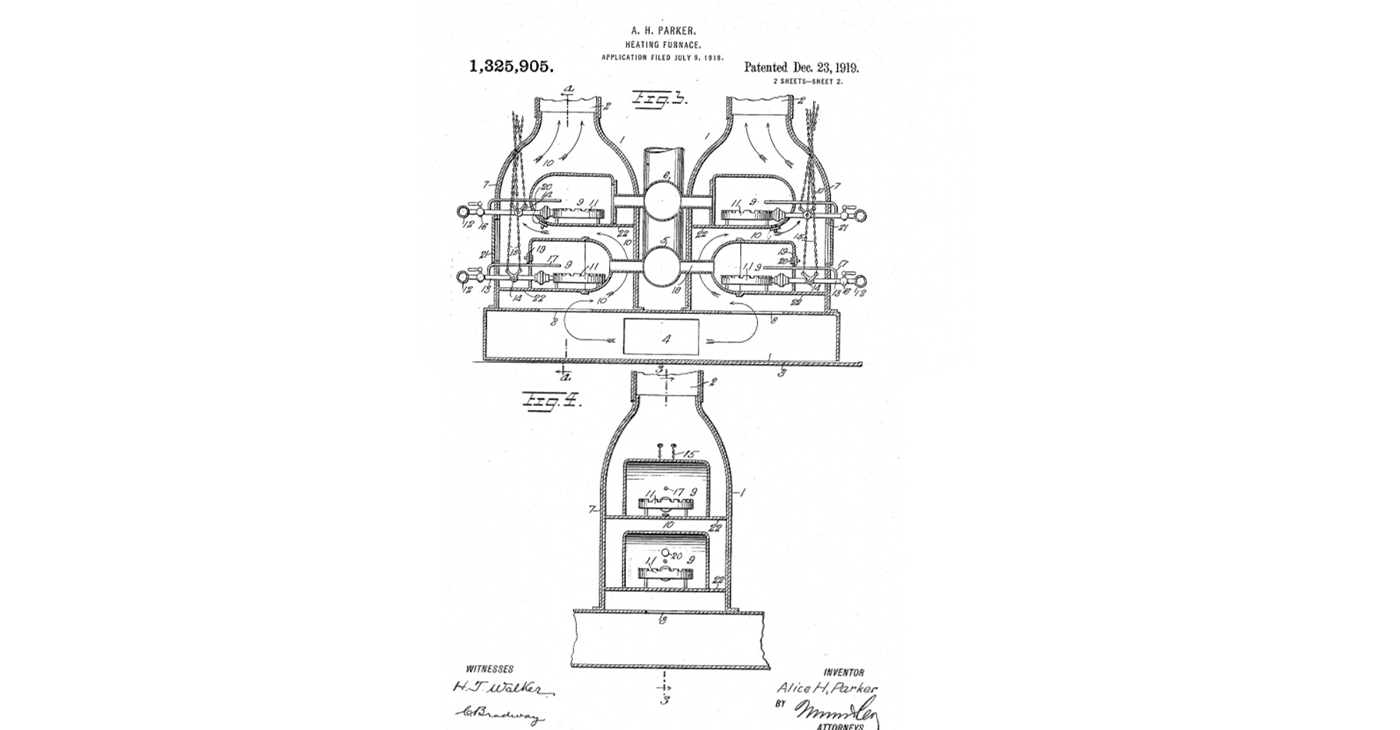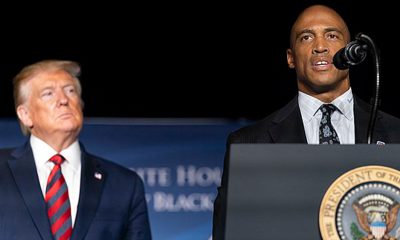National
Miramar Mayor Wayne Messam Enters 2020 Presidential Race
THE WESTSIDE GAZETTE — The state of Florida has a well-regarded reputation for being in the spotlight when it comes to national elections, and if it is up to Wayne Messam, the 2020 presidential election will not be any different.
By Perry Busby
The state of Florida has a well-regarded reputation for being in the spotlight when it comes to national elections, and if it is up to Wayne Messam, the 2020 presidential election will not be any different.
Taking the stage in front of a crowd of 300-plus boisterous supporters at Florida Memorial University’s Lou Rawls Center for the Performing Arts, the South Florida native and current mayor of Miramar officially launched his campaign and became the latest candidate to enter the U.S. presidential race.
He enters a crowded field of Democratic Party candidates—which now stands at fifteen—with more candidates, including former Vice-President Joe Biden, expecting to announce and other high-profile candidates like Georgia Democrat, Stacy Abrams, still mulling their decisions.
Messam kicked off his campaign with a bold speech filled with ambitious plans to address jobs, the economy, gun violence, climate change and the growing college student debt crisis. While many of his talking points had a familiar tone to those previously espoused by other Democratic candidates, Mayor Messam was able to present his message with a level of awareness and acuity that connected with the audience.
Jobs & Economy
In 2018, the city of Miramar was ranked as one of the fastest-growing economies in the country. Also, last year the city was successful in negotiating a deal with JL Audio that allowed the audio manufacturer to expand its local facilities and prevented the offshoring of over 500 jobs to China. Both were among the many initiatives Mayor Messam highlighted as he presented his action plan for growing jobs and improving the nation’s infrastructure.
Although he did not present a specific plan for jobs growth, Messam says his plan to eliminate student debt would incorporate economic models that could potentially create 1.2 to 1.5 million jobs over the first few years. His plans for economic growth are based on research data which indicate that by eliminating student debt, the average student borrower would receive an immediate relief of $400 per month. This relief would allow borrowers to put more money back into the economy by spending, saving or investing.
Gun Violence
Messam pointed to the increased number of mass murders on school campuses and in public places, gun violence in urban communities and Florida’s Stand Your Ground law as key reasons for responsible gun legislation. He is calling for responsible gun reform measures.
The mayor also informed the audience that he has joined a group of mayors who are suing the state over an NRA-supported law that allows the governor to fine or suspend an elected official if the official is responsible for drafting or passage of ordinances that regulate firearms or ammunition. According to Messam, municipal leaders are better qualified to enact ordinances that are suitable for safety of their constituents.
Climate Change
With South Florida feeling the brunt of the effects of climate change with flooding, an eroding coastline and severe storms, Mayor Messam pledged his full support to reenter the Paris Agreement. Among the efforts he pointed to was the fight he led against the oil industry’s campaign to drill in Big Cypress National Preserve, adjacent to the Everglades.
Student Debt
Student debt is at the foundation of Mayor Meesam’s platform. With over 45 million Americans owing more than $1.5 trillion in private and public loans, Messam sees this as the lynchpin of America’s sluggish economy. “It is immoral for this country to re-quire our citizens to take on tens of thousands of dollars of debt to achieve the American Dream,” he proclaimed before a crowd of cheering parents and students.
Messam’s plan calls for the federal government to cancel all federal and private student loans. He believes the mechanics of complete debt cancellation for the majority of loans would be relatively straightforward since the Department of Education owns about 95 percent of America’s student loan debt.
To offset the cost of the debt forgiveness package, Messam wants to begin by rescinding the 2017 tax cut package, which was aimed at large corporations and the very wealthy.
He is promoting the measure as a stimulus package, much like the one the government used to bail out the banks in 2008.
The Road Ahead
We live in a media-driven age where many voters are informed through bite-sized chunks of news. Between the current administration’s daily debacles, Congress’ battle to uncover the truth about Russian interference in the 2016 election and the media’s desire to cover ‘Hot Topic’ issues on the latest celebrity candidate, finding the space to get his message out will be a daunting task for Mayor Messam.
With the Democratic National Committee setting the bar at 65,000 for the number of donors a candidate must have in order to be on the debate stage, Mayor Messam must first clear this hurdle if he is to have a legitimate chance. Early data shows that over the weekend he has received donations from over 200 Florida residents and donations from 38 states. And, according to Google, search activity for “Wayne Messam” during his livestream launch surpassed candidates who have been in the race for months.
When asked if he sees himself as a longshot or his candidacy as a Cinderella story, Messam said he embraces those titles and uses them as fuel to push forward. “I’m from a small town called South Bay. Many people would say not much comes out of South Bay. As a teen I was determined to make it out, and I did. I was able to attend Florida State University and play for on a National Championship team. I started a construction business when the economy was in a downward spiral and worked to see it later receive national awards. And, finally I became Mayor of a wonderful city by beating an incumbent when others said it couldn’t be done. So, I guess you could say I’m used to starting from this position.”
It should be noted that combined, all the issues Mayor Messam raises impact South Floridians in a way unlike any other region. Hopefully as his campaign progresses, the mayor will find a way to resonate with voters and establish an advantage by drawing from his unique South Florida experiences.
This article originally appeared in The Westside Gazette.
Arts and Culture
In ‘Affrilachia: Testimonies,’ Puts Blacks in Appalacia on the Map

By Terri Schlichenmeyer
The Bookworm Sez
An average oak tree is bigger around than two people together can reach.
That mighty tree starts out with an acorn the size of a nickel, ultimately growing to some 80 feet tall, with a canopy of a hundred feet or more across.
And like the new book, “Affrilachia” by Chris Aluka Berry (with Kelly Elaine Navies and Maia A. Surdam), its roots spread wide and wider.
Affriclachia is a term a Kentucky poet coined in the 1990s referring to the Black communities in Appalachia who are similarly referred to as Affrilachians.
In 2016, “on a foggy Sunday morning in March,” Berry visited Affrilachia for the first time by going the Mount Zion AME Zion Church in Cullowhee, North Carolina. The congregation was tiny; just a handful of people were there that day, but a pair of siblings stood out to him.
According to Berry, Ann Rogers and Mae Louise Allen lived on opposite sides of town, and neither had a driver’s license. He surmised that church was the only time the elderly sisters were together then, but their devotion to one another was clear.
As the service ended, he asked Allen if he could visit her. Was she willing to talk about her life in the Appalachians, her parents, her town?
She was, and arrangements were made, but before Barry could get back to Cullowhee, he learned that Allen had died. Saddened, he wondered how many stories are lost each day in mountain communities where African Americans have lived for more than a century.
“I couldn’t make photographs of the past,” he says, “but I could document the people and places living now.”
In doing so he also offers photographs that he collected from people he met in ‘Affrilachia,’ in North Carolina, Georgia, Kentucky, and Tennessee, at a rustic “camp” that was likely created by enslaved people, at churches, and in modest houses along highways.
The people he interviewed recalled family tales and community stories of support, hardship, and home.
Says coauthor Navies, “These images shout without making a sound.”
If it’s true what they say about a picture being worth 1,000 words, then “Affrilachia,” as packed with photos as it is, is worth a million.
With that in mind, there’s not a lot of narrative inside this book, just a few poems, a small number of very brief interviews, a handful of memories passed down, and some background stories from author Berry and his co-authors. The tales are interesting but scant.
For most readers, though, that lack of narrative isn’t going to matter much. The photographs are the reason why you’d have this book.
Here are pictures of life as it was 50 years or a century ago: group photos, pictures taken of proud moments, worn pews, and happy children. Some of the modern pictures may make you wonder why they’re included, but they set a tone and tell a tale.
This is the kind of book you’ll take off the shelf, and notice something different every time you do. “Affrilachia” doesn’t contain a lot of words, but it’s a good choice when it’s time to branch out in your reading.
“Affrilachia: Testimonies,” by Chris Aluka Berry with Kelly Elaine Navies and Maia A. Surdam
c.2024, University of Kentucky Press, $50.00.
Black History
Alice Parker: The Innovator Behind the Modern Gas Furnace
Born in Morristown, New Jersey, in 1895, Alice Parker lived during a time when women, especially African American women, faced significant social and systemic barriers. Despite these challenges, her contributions to home heating technology have had a lasting impact.

By Tamara Shiloh
Alice Parker was a trailblazing African American inventor whose innovative ideas forever changed how we heat our homes.
Born in Morristown, New Jersey, in 1895, Parker lived during a time when women, especially African American women, faced significant social and systemic barriers. Despite these challenges, her contributions to home heating technology have had a lasting impact.
Parker grew up in New Jersey, where winters could be brutally cold. Although little is documented about her personal life, her education played a crucial role in shaping her inventive spirit. She attended Howard University, a historically Black university in Washington, D.C., where she may have developed her interest in practical solutions to everyday challenges.
Before Parker’s invention, most homes were heated using wood or coal-burning stoves. These methods were labor-intensive, inefficient, and posed fire hazards. Furthermore, they failed to provide even heating throughout a home, leaving many rooms cold while others were uncomfortably warm.
Parker recognized the inefficiency of these heating methods and imagined a solution that would make homes more comfortable and energy-efficient during winter.
In 1919, she patented her design for a gas-powered central heating system, a groundbreaking invention. Her design used natural gas as a fuel source to distribute heat throughout a building, replacing the need for wood or coal. The system allowed for thermostatic control, enabling homeowners to regulate the temperature in their homes efficiently.
What made her invention particularly innovative was its use of ductwork, which channeled warm air to different parts of the house. This concept is a precursor to the modern central heating systems we use today.
While Parker’s design was never fully developed or mass-produced during her lifetime, her idea laid the groundwork for modern central heating systems. Her invention was ahead of its time and highlighted the potential of natural gas as a cleaner, more efficient alternative to traditional heating methods.
Parker’s patent is remarkable not only for its technical innovation but also because it was granted at a time when African Americans and women faced severe limitations in accessing patent protections and recognition for their work. Her success as an inventor during this period is a testament to her ingenuity and determination.
Parker’s legacy lives on in numerous awards and grants – most noticeably in the annual Alice H. Parker Women Leaders in Innovation Award. That distinction is given out by the New Jersey Chamber of Commerce to celebrate outstanding women innovators in Parker’s home state.
The details of Parker’s later years are as sketchy as the ones about her early life. The specific date of her death, along with the cause, are also largely unknown.
Activism
U.S. House Minority Leader Hakeem Jeffries Speaks on Democracy at Commonwealth Club
Based on his first speech as House minority leader, “The ABCs of Democracy” by Grand Central Publishing is an illustrated children’s book for people of all ages. Each letter contrasts what democracy is and isn’t, as in: “American Values over Autocracy”, “Benevolence over Bigotry” and “The Constitution over the Cult.”

By Linda Parker Pennington
Special to The Post
House Minority Leader Hakeem Jeffries addressed an enthusiastic overflow audience on Monday at San Francisco’s Commonwealth Club, launching his first book, “The ABCs of Democracy.”
Based on his first speech as House minority leader, “The ABCs of Democracy” by Grand Central Publishing is an illustrated children’s book for people of all ages.
Each letter contrasts what democracy is and isn’t, as in: “American Values over Autocracy”, “Benevolence over Bigotry” and “The Constitution over the Cult.”
Less than a month after the election that will return Donald Trump to the White House, Rep. Jeffries also gave a sobering assessment of what the Democrats learned.
“Our message just wasn’t connecting with the real struggles of the American people,” Jeffries said. “The party in power is the one that will always pay the price.”
On dealing with Trump, Jeffries warned, “We can’t fall into the trap of being outraged every day at what Trump does. That’s just part of his strategy. Remaining calm in the face of turmoil is a choice.”
He pointed out that the razor-thin margin that Republicans now hold in the House is the lowest since the Civil War.
Asked what the public can do, Jeffries spoke about the importance of being “appropriately engaged. Democracy is not on autopilot. It takes a citizenry to hold politicians accountable and a new generation of young people to come forward and serve in public office.”
With a Republican-led White House, Senate, House and Supreme Court, Democrats must “work to find bi-partisan common ground and push back against far-right extremism.”
He also described how he is shaping his own leadership style while his mentor, Speaker-Emeritus Nancy Pelosi, continues to represent San Francisco in Congress. “She says she is not hanging around to be like the mother-in-law in the kitchen, saying ‘my son likes his spaghetti sauce this way, not that way.’”
-

 California Black Media4 weeks ago
California Black Media4 weeks agoCalifornia to Offer $43.7 Million in Federal Grants to Combat Hate Crimes
-

 Black History4 weeks ago
Black History4 weeks agoEmeline King: A Trailblazer in the Automotive Industry
-

 California Black Media4 weeks ago
California Black Media4 weeks agoGov. Newsom Goes to Washington to Advocate for California Priorities
-

 California Black Media4 weeks ago
California Black Media4 weeks agoCalifornia Department of Aging Offers Free Resources for Family Caregivers in November
-

 Activism3 weeks ago
Activism3 weeks agoOakland Post: Week of November 27 – December 3, 2024
-

 Activism4 weeks ago
Activism4 weeks agoOCCUR Hosts “Faith Forward” Conference in Oakland
-

 Activism4 weeks ago
Activism4 weeks agoRichmond Seniors Still Having a Ball After 25 Years
-

 Activism2 weeks ago
Activism2 weeks agoButler, Lee Celebrate Passage of Bill to Honor Congresswoman Shirley Chisholm with Congressional Gold Medal
























































1 Comment